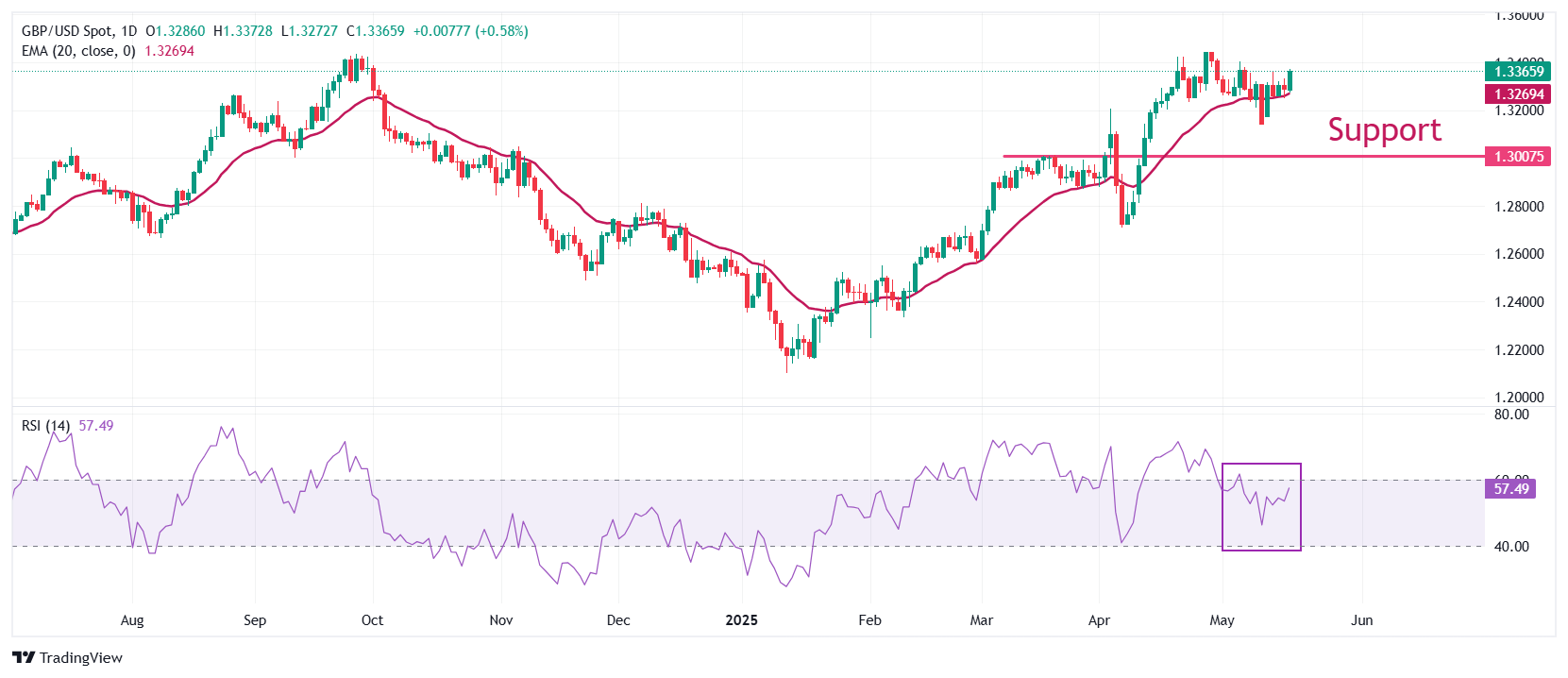Created
: 2025.05.19














![]() 2025.05.19 17:01
2025.05.19 17:01
The Pound Sterling (GBP) trades higher against its major peers, except the Euro (EUR), at the start of the week. The British currency moves higher ahead of the European Union (EU)-United Kingdom (UK) trade summit in London on Monday. Investors will pay close attention to a potential trade deal as it will strengthen economic ties between the economies since the announcement of Brexit.
According to comments from the Head of Trade Policy at the British Chamber of Commerce, William Bain, in a Jefferies-hosted session over the weekend, the potential deal between the UK and the EU would benefit various British industries such as defence, agriculture, and energy. Bain stated that the non-binding defence pact will unlock business worth 150 billion Euros for UK arms suppliers. The deal between European economies also aims to remove non-tariff barriers across agricultural industries.
For the last week, the British currency has performed strongly on the back of an upbeat UK Gross Domestic Product (GDP) report. The data showed on Thursday that the economy expanded at a robust pace of 0.7% in the first quarter of the year.
This week, investors will pay attention to the UK Consumer Price Index (CPI) data for April to get fresh cues about the Bank of England's (BoE) monetary policy outlook, which will be released on Wednesday. The data is expected to show that the core CPI - which excludes volatile components of food, energy, alcohol, and tobacco - is expected to have grown at a faster pace of 3.6%, compared to the prior release of 3.4%.

The Pound Sterling climbs above 1.3370 against the US Dollar on Monday. The GBP/USD pair holds above the 20-day Exponential Moving Average (EMA), which trades around 1.3270, suggesting that the near-term trend is bullish.
The 14-day Relative Strength Index (RSI) points upwards inside the 40.00-60.00 range. A fresh bullish momentum would appear if the RSI breaks above 60.00.
On the upside, the three-year high of 1.3445 will be a key hurdle for the pair. Looking down, the psychological level of 1.3000 will act as a major support area.
The Pound Sterling (GBP) is the oldest currency in the world (886 AD) and the official currency of the United Kingdom. It is the fourth most traded unit for foreign exchange (FX) in the world, accounting for 12% of all transactions, averaging $630 billion a day, according to 2022 data. Its key trading pairs are GBP/USD, also known as 'Cable', which accounts for 11% of FX, GBP/JPY, or the 'Dragon' as it is known by traders (3%), and EUR/GBP (2%). The Pound Sterling is issued by the Bank of England (BoE).
The single most important factor influencing the value of the Pound Sterling is monetary policy decided by the Bank of England. The BoE bases its decisions on whether it has achieved its primary goal of "price stability" - a steady inflation rate of around 2%. Its primary tool for achieving this is the adjustment of interest rates. When inflation is too high, the BoE will try to rein it in by raising interest rates, making it more expensive for people and businesses to access credit. This is generally positive for GBP, as higher interest rates make the UK a more attractive place for global investors to park their money. When inflation falls too low it is a sign economic growth is slowing. In this scenario, the BoE will consider lowering interest rates to cheapen credit so businesses will borrow more to invest in growth-generating projects.
Data releases gauge the health of the economy and can impact the value of the Pound Sterling. Indicators such as GDP, Manufacturing and Services PMIs, and employment can all influence the direction of the GBP. A strong economy is good for Sterling. Not only does it attract more foreign investment but it may encourage the BoE to put up interest rates, which will directly strengthen GBP. Otherwise, if economic data is weak, the Pound Sterling is likely to fall.
Another significant data release for the Pound Sterling is the Trade Balance. This indicator measures the difference between what a country earns from its exports and what it spends on imports over a given period. If a country produces highly sought-after exports, its currency will benefit purely from the extra demand created from foreign buyers seeking to purchase these goods. Therefore, a positive net Trade Balance strengthens a currency and vice versa for a negative balance.
![]()
Created
: 2025.05.19
![]()
Last updated
: 2025.05.19

FXStreet is a forex information website, delivering market analysis and news articles 24/7.
It features a number of articles contributed by well-known analysts, in addition to the ones by its editorial team.
Founded in 2000 by Francesc Riverola, a Spanish economist, it has grown to become a world-renowned information website.
We hope you find this article useful. Any comments or suggestions will be greatly appreciated.
We are also looking for writers with extensive experience in forex and crypto to join us.
please contact us at [email protected].
Disclaimer:
All information and content provided on this website is provided for informational purposes only and is not intended to solicit any investment. Although all efforts are made in order to ensure that the information is correct, no guarantee is provided for the accuracy of any content on this website. Any decision made shall be the responsibility of the investor and Myforex does not take any responsibility whatsoever regarding the use of any information provided herein.
The content provided on this website belongs to Myforex and, where stated, the relevant licensors. All rights are reserved by Myforex and the relevant licensors, and no content of this website, whether in full or in part, shall be copied or displayed elsewhere without the explicit written permission of the relevant copyright holder. If you wish to use any part of the content provided on this website, please ensure that you contact Myforex.
Myforex uses cookies to improve the convenience and functionality of this website. This website may include cookies not only by us but also by third parties (advertisers, log analysts, etc.) for the purpose of tracking the activities of users. Cookie policy